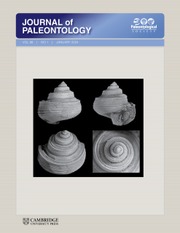Article contents
The first fossil record of the genus Phycosoma (Araneae, Theridiidae) from the lower Miocene Mexican amber, with the description of a new species
Published online by Cambridge University Press: 03 June 2022
Abstract
Theridiidae is a family of spiders with the fourth highest richness of extant species worldwide. Fossil Theridiidae is also the family of spiders with the largest number of Cretaceous, Eocene, and Miocene representatives. Phycosoma Pickard-Cambridge, 1880 is a theridiid genus without a fossil representative. In this study, we describe a new fossil species of Phycosoma, P. icti† n. sp., from an adult male specimen found in a piece of amber from the lower Miocene (ca. 23 Ma), from the Montecristo mines near Simojovel de Allende, Chiapas, Mexico. Phycosoma icti† n. sp. can be distinguished from all other Phycosoma males except P. corrugum by the long embolus partly covered by the conductor. In addition, it can be distinguished from P. corrugum by the oblique and constricted median apophysis; the narrow and pointed conductor; the long, curved, and bent theridiid tegular apophysis in its distal portion; and the prosoma ringed in the middle and along the ventral margin. Phycosoma icti† n. sp. represents the oldest recovered record of the genus. Extant Phycosoma species are still present in Chiapas, suggesting an extended evolutionary history of the genus in the region despite major geological changes over this time span in North America.
UUID: http://zoobank.org/28d74f14-0f80-405d-a165-f24749e15d05
Information
- Type
- Articles
- Information
- Copyright
- Copyright © The Author(s), 2022. Published by Cambridge University Press on behalf of The Paleontological Society
References
- 2
- Cited by


